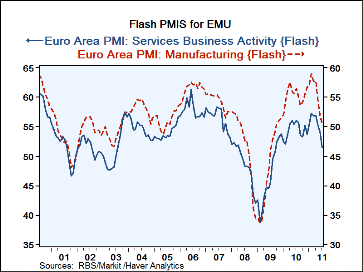 Global| Jul 21 2011
Global| Jul 21 2011EMU PMIs Drop at Extremely Sharp Pace...DANGER! DANGER!
Summary
EMU PMIs are falling substantially and now sharply as well. The monthly drop in the Services index is the THIRD LARGEST of its history of 156 months (13years). For MFG it is the 17th largest monthly drop over the same span. For MFG [...]
 EMU PMIs are falling substantially and now sharply as well. The monthly drop in the Services index is the
THIRD LARGEST of its history of 156 months (13years). For MFG it is the 17th largest monthly drop over the same span.
EMU PMIs are falling substantially and now sharply as well. The monthly drop in the Services index is the
THIRD LARGEST of its history of 156 months (13years). For MFG it is the 17th largest monthly drop over the same span.
For MFG the drop over three-months ranks as the third worst in the history of the index, so the sense of this being a large decline is more than just one month. Indeed the multi-month picture is more relevant and all the more chilling. For services the three-month drop is in the third worst in its history. And what's worse is that the European debt crisis is still unresolved and may still be spreading its effects.
These are big drops these are drops of substantial speed. The MFG index now sits in the 31st percentile of its queue of value-in the lower one-third. Services sits in the 22nd percentile of its historic queue, near the bottom one-fifth of its history of observations.
With Europeans meeting to decide on Greece's fate and reports talking about allowing some sort of default being allowed, an action that surely would bring pressure to bear on Ireland, Portugal, and perhaps Spain and Italy as well, we have to take a dim view of economic prospects in the Zone. UK consumer confidence has dropped although UK retail sales managed a monthly rise.
On the whole the EU/EMU data have not been very compelling and the sense of Germany as the backbone of growth is under real pressure after these 'flash' reports on MFG and Services in the Zone since German's own situation has taken a similar sharp turn for the worse.
Knock-on effects or learning by someone else's undoing - As Europe stews in its own juices the US is trying to clear its head to deal with its own burgeoning debt problem. The most important thing in the US is to create jobs to halt the economy's slide and ongoing underperformance of tax revenues; a long jam on the debt ceiling hike is not going to further the goal of job creation. Beyond that the US needs to hike the debt ceiling and to get some long term deficit-reduction plan on the books. We can see from the extreme and growing weakness in Europe that exports, a sector that has been an important aid to US growth in this cycle, can no longer be relied upon for strength. If our lawmakers do not come to their senses we could see the same sort of carnage visit our purchaser reports and our economy. But there is little evidence that the shifting and deteriorating macroeconomic picture has had any impact on the ideologues of either party. While some centrists have come together, the battle rages on, in the lunatic fringe of each party.
Europe's situation is grim. The US situation is getting dire.
Robert Brusca
AuthorMore in Author Profile »Robert A. Brusca is Chief Economist of Fact and Opinion Economics, a consulting firm he founded in Manhattan. He has been an economist on Wall Street for over 25 years. He has visited central banking and large institutional clients in over 30 countries in his career as an economist. Mr. Brusca was a Divisional Research Chief at the Federal Reserve Bank of NY (Chief of the International Financial markets Division), a Fed Watcher at Irving Trust and Chief Economist at Nikko Securities International. He is widely quoted and appears in various media. Mr. Brusca holds an MA and Ph.D. in economics from Michigan State University and a BA in Economics from the University of Michigan. His research pursues his strong interests in non aligned policy economics as well as international economics. FAO Economics’ research targets investors to assist them in making better investment decisions in stocks, bonds and in a variety of international assets. The company does not manage money and has no conflicts in giving economic advice.






